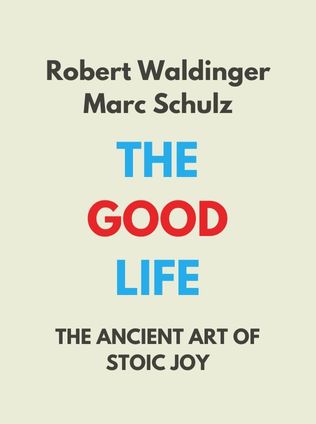
The Good Life
The Ancient Art of Stoic Joy
By Robert Waldinger and Marc Schulz
Published 11/2008
About the Author
Robert Waldinger, a psychiatrist, and Marc Schulz, a psychologist, are widely recognized for their groundbreaking work in understanding what makes life truly fulfilling. They are the current leaders of the Harvard Study of Adult Development, which is one of the longest-running studies in history. Waldinger, as the current director, and Schulz, as the co-director, have dedicated decades to unraveling the secrets of happiness and longevity. Their insights, presented in The Good Life, are drawn from a rich history of data and personal stories, offering profound wisdom on how relationships are the key to living a meaningful life.
Main Idea
The central thesis of The Good Life is that the quality of our relationships determines the quality of our lives. Waldinger and Schulz challenge the common belief that career success or financial wealth are the primary drivers of happiness. Instead, they argue, it is the strength and positivity of our relationships that have the most profound impact on our well-being. This idea is supported by over eight decades of data from the Harvard Study, which shows that those who maintain close, meaningful relationships live happier, healthier, and longer lives.
Table of Contents
- Understanding the Good Life
- Evaluating Your Current Relationships
- Improving Your Relationships in General
- Improving Specific Relationships
Understanding the Good Life
The concept of a "good life" is rooted in the ancient philosophy of eudaimonia, a term introduced by Aristotle. This concept goes beyond mere happiness, encompassing a deeper sense of fulfillment, purpose, and well-being. Waldinger and Schulz interpret eudaimonia as a state of flourishing that is achieved through living in accordance with one's values and maintaining strong, positive relationships.
In their view, a good life is not about the accumulation of wealth or status but about the richness of our social connections. "Happiness is love. Full stop," Waldinger quotes George Vaillant, one of the previous directors of the Harvard Study, to emphasize that the essence of a good life lies in the quality of our relationships.
The Role of Relationships in a Good Life
Waldinger and Schulz’s research reveals that relationships are the primary source of happiness. They provide a sense of belonging, purpose, and support that cannot be matched by material success. Positive relationships act as a buffer against life's challenges, helping us navigate stress, loss, and adversity more effectively. The authors highlight that it is not the number of relationships that matters but their quality. A few deep, meaningful connections are far more valuable than a large network of acquaintances.
The Impact of Loneliness
Loneliness, on the other hand, is identified as a significant threat to well-being. The authors explain that loneliness triggers a stress response that can have severe consequences for both mental and physical health. This stress response is rooted in our evolutionary past, where being isolated from the tribe could mean danger or death. In the modern world, chronic loneliness leads to prolonged stress, which can deteriorate health and well-being.
"Loneliness kills. It’s as powerful as smoking or alcoholism." - Robert Waldinger
Social Isolation vs. Loneliness
Waldinger and Schulz make an important distinction between social isolation and loneliness. Social isolation refers to the objective lack of social connections, while loneliness is the subjective feeling of being alone, regardless of the actual level of social interaction. The authors point out that it is possible to be socially isolated without feeling lonely and vice versa. However, both conditions are harmful to health and happiness. They advocate for maintaining both strong and weak social ties to combat these feelings and enhance overall well-being.
Evaluating Your Current Relationships
To live a good life, it’s essential to regularly evaluate the state of your relationships. Waldinger and Schulz provide a practical framework for doing so, which involves understanding the stages of life and assessing your "social fitness."
Understanding Life Stages
The authors divide life into four main stages: adolescence, young adulthood, midlife, and late life. Each stage presents unique challenges and opportunities for building and maintaining relationships. Adolescence, for example, is a period focused on identity formation, with peer relationships playing a crucial role. Young adulthood involves the stress of establishing a career and possibly starting a family, which can strain other relationships. Midlife often brings stability but also a sense of stagnation or crisis, while late life is characterized by a reflection on one's legacy and the quality of relationships maintained over a lifetime.
Sign up for FREE and get access to 1,400+ books summaries.
You May Also Like
The Subtle Art of Not Giving a F*ck
A Counterintuitive Approach to Living a Good Life
By Mark MansonRich Dad Poor Dad
What the Rich Teach Their Kids About Money - That the Poor and Middle Class Do Not!
By Robert T. KiyosakiHow To Win Friends and Influence People
The All-Time Classic Manual Of People Skills
By Dale CarnegieFreakonomics
A Rogue Economist Explores the Hidden Side of Everything
By Steven D. Levitt and Stephen J. Dubner



















